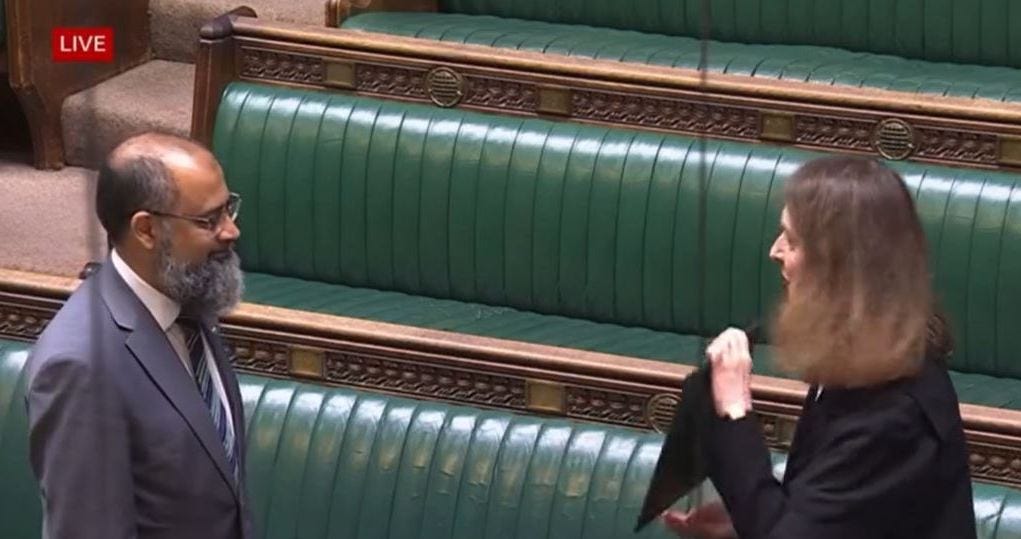We cannot IGNORE the rise of sectarian Islamic politics in Britain
What the recent election reveals about a very worrying trend
Matt Goodwin’s Substack goes to more than 54,200 subscribers from 167 countries around the world and thousands of paying supporters who support our work. Like our stuff? Then help us expand by becoming a paying supporter and access everything —the archive, exclusive posts, polling, discounts, leave comments, join the debate, get advance notice about events, and the knowledge you’re supporting independent writers who are not afraid to push back against the grain. You can also join us on YouTube, Instagram, TikTok, Twitter/X and Facebook.
Here’s a shocking story you might have missed. During the UK’s recent election a man named Iqbal Mohamed, who would later be elected as an independent Member of Parliament, called on local Muslims to “follow the teachings of the Prophet” by voting for him. Standing on a prayer mat, flanked by a local imam and wearing religious dress, Mohamed, The Times just revealed, said this to the male-only event:
“Mohamed warned voters that, if they failed to vote, Allah would ask them: “I gave you this [blessing], what did you do with it?” He said Muslims had a “duty” to vote for “just representatives” and gestured to an imam next to him before saying “with the ulema [a collective term for Islamic clerics] as my witness I promise to try and be that just representative” … One form of worship, he continued, was selecting appropriate political representatives.”
Why does this matter? Why does it matter that a Muslim candidate, now sitting in the House of Commons, said: “If we do not use our vote, Allah Subhanahu Wa Ta’ala [may Allah be praised and exalted] will ask us: ‘I gave you this ni’mah [blessing], what did you do with it?’” And why does it matter that he urged voters to “follow your conscience, follow the teachings of the Prophet sallallahu alayhi wa sallam [peace be upon him] and vote for a just leader, a just representative”?
It matters because of what it reveals about a shocking new turn in British politics —the creeping and now unavoidable rise of a sectarian, Islamic politics in our country.
You won’t hear much about this from the two big parties, both of which have enabled the rise of this dark force. But the blunt reality, today, as I warned months ago, is that British politics is now giving rise to a politics that is no longer organised around the national interest but, instead, religious and tribal lines.
Increasingly, as many of our MPs know but are too scared to say out loud, this Islamic sectarian politics is undermining our established laws, ways of life, and is making many British people, understandably, feel nervous about the future.
According to British law, voters are supposed to be protected from improper religious influence. Under the Elections Act of 2022, it is a criminal offence to suggest that to vote or not vote for a candidate is a duty arising from religious beliefs.
This is why, not so long ago, you might remember Lutfur Rahman being removed as mayor of Tower Hamlets. He had rigged votes and subjected local voters to religious intimidation through the use of imams and peer pressure (and was later re-elected).
But now, after the 2024 election, which delivered a significant number of MPs who mobilised along sectarian lines, this growing threat to our democracy has found itself in the very centre of power, in Westminster.
While much of the political class has its head in the sand, this problem has become impossible to ignore. In a number of heavily Muslim seats, Labour saw its majorities slashed by campaigns that were more interested in Palestine than potholes.
Overall, five independent candidates won election to the House of Commons—including Iqbal Mohamed in Dewsbury, Shockat Adam in Leicester, Ayoub Khan in Birmingham, and Adnan Hussain in Blackburn.
All of these candidates, furthermore, were supported by The Muslim Vote, a group …
Keep reading with a 7-day free trial
Subscribe to Matt Goodwin to keep reading this post and get 7 days of free access to the full post archives.


